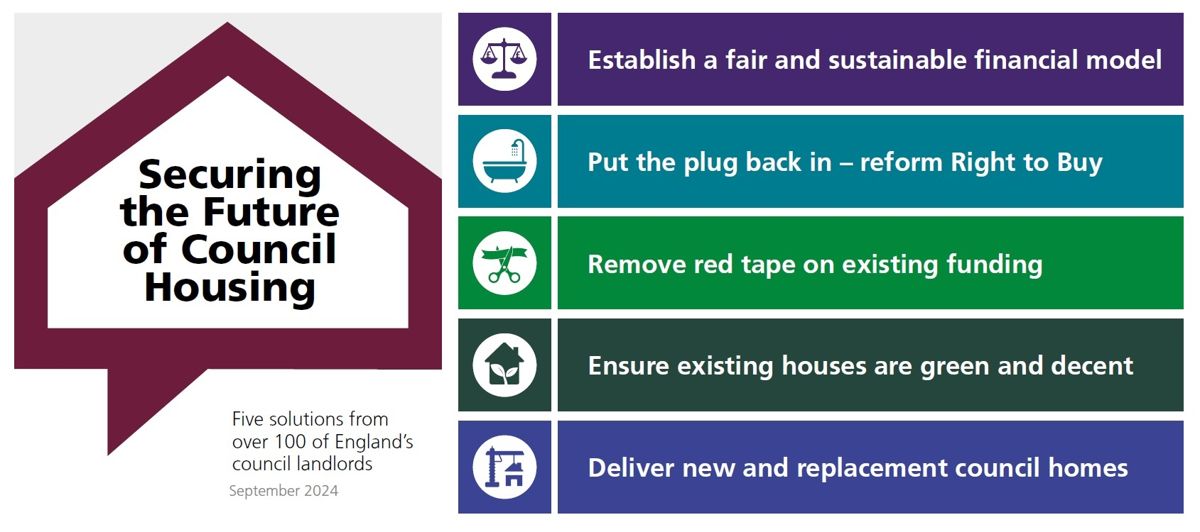A groundbreaking report titled “Securing the Future of Council Housing” has emerged from a coalition of over 100 local councils in England, led by Leeds City Council, to propose five essential measures aimed at revitalizing council housing. The plan emphasizes innovative financing, protection of housing stock, streamlined funding processes, upgraded living standards by 2030, and the restart of stalled projects, all in response to the urgent need for affordable homes amid a staggering 109,000 households living in temporary accommodations.
What are the key measures proposed in the report for the future of council housing?
The report proposes five key measures to transform council housing:
1. Establish a new model for council housing financing.
2. Reform Right to Buy policies to protect housing stock.
3. Reduce bureaucratic processes for fund access and use.
4. Upgrade all council housing to high safety, decency, and energy standards by 2030.
5. Restart and complete previously stalled building projects.
A United Front in Addressing Housing Crises
Local authorities across England understand the significant role they play in addressing the nation’s housing crises. In an unprecedented move, Leeds City Council has aligned with over 100 other local governments to place a spotlight on the potential collective impact they can muster. The cross-party coalition has released a detailed report aiming to sharpen the focus on the necessity of council housing and the immediate actions required to safeguard its future. Coordinated by Southwark Council, the thrust of the report is clear: to lay out a clear and actionable plan for the regeneration of council housing for the coming decade.
The document also presents a grim account of the financial strain encumbering local councils, many of which grapple with the dual challenges of maintaining current housing stock and initiating new construction projects. The urgency is underscored by the staggering figure of 109,000 households in England currently residing in temporary accommodations, marking a high-water point in the need for affordable and secure housing solutions. At the report’s unveiling in Westminster, Councillor James Lewis of Leeds City Council will call for a pragmatic, equitable, and sustainable approach to achieve the nation’s social housing goals.
Key Measures for Transformation
In the pursuit of a transformative approach to council housing, the report lays down a quintet of measures aimed at fostering collaboration between local authorities and the central government. The recommendations are geared towards establishing a solid foundation for the next generation of council housing. Among these suggestions is the establishment of a new and enduring model for council housing financing. Another critical recommendation is the reform of the Right to Buy policies to safeguard newly-built council homes from immediate resale, thus ensuring a longer-term housing stock.
Cutting through bureaucratic red tape stands as another pillar, with a call for simplified access to and utilization of existing funds. Additionally, a Green & Decent Homes Programme is proposed, targeting all council housing to be upgraded to a superior standard of safety, decency, and energy efficiency by 2030. The final piece of the puzzle involves addressing and jumpstarting building projects that have previously stalled. Councillor James Lewis states, “Council housing provides the stability and security that transforms lives and builds thriving, inclusive communities. It is vital, therefore, that everyone, at all levels of government, takes today’s report as a cue to work together to safeguard its future.”
Building for a Sustainable Future
Leeds’s unwavering dedication to securing quality homes for its residents is evidenced by the considerable strides made through its Council Housing Growth Programme (CHGP). Since 2018, more than 350 homes have emerged from this initiative, with the Gascoigne House extra care facility and the redevelopment at Meynell Approach standing out as flagship projects. Complementing the new constructions are approximately 330 homes acquired under the same programme, all of which significantly contribute to mitigating the local affordable housing crunch.
Looking ahead, Leeds has a promising pipeline of roughly 1,600 affordable homes that are in various stages of construction, thanks to the CHGP and other associated schemes with council partnership. Councillor Jess Lennox, Leeds City Council’s executive member for housing, affirms the positive impact of the programme and the council’s resolve to build upon these successes. “We are fully aware that there is still much more to do,” Councillor Lennox points out, “It is our hope that the ideas outlined in today’s report will help give us the resources and tools we need to go faster and further with our work to provide good-quality affordable homes that are a source of pride for all.”
The full report, titled “Securing the Future of Council Housing,” serves as a testament to the efforts and foresight of councils across England, championing a future where everyone can have access to a home that not only meets their needs but is also a source of community pride.
- The report “Securing the Future of Council Housing” was developed by a coalition of over 100 local councils in England, led by Leeds City Council, to propose essential measures for revitalizing council housing.
- Five key measures outlined in the report include establishing a new financing model, reforming Right to Buy policies, reducing bureaucratic hurdles, upgrading housing standards by 2030, and restarting stalled building projects.
- The report highlights the urgent need for affordable housing, as 109,000 households in England are currently living in temporary accommodations.
- The coalition aims for a collaborative approach between local authorities and the central government to ensure a sustainable future for council housing.
- Leeds City Council’s ongoing initiatives, such as the Council Housing Growth Programme, have already produced over 350 new homes and aim to construct approximately 1,600 more affordable housing units.
